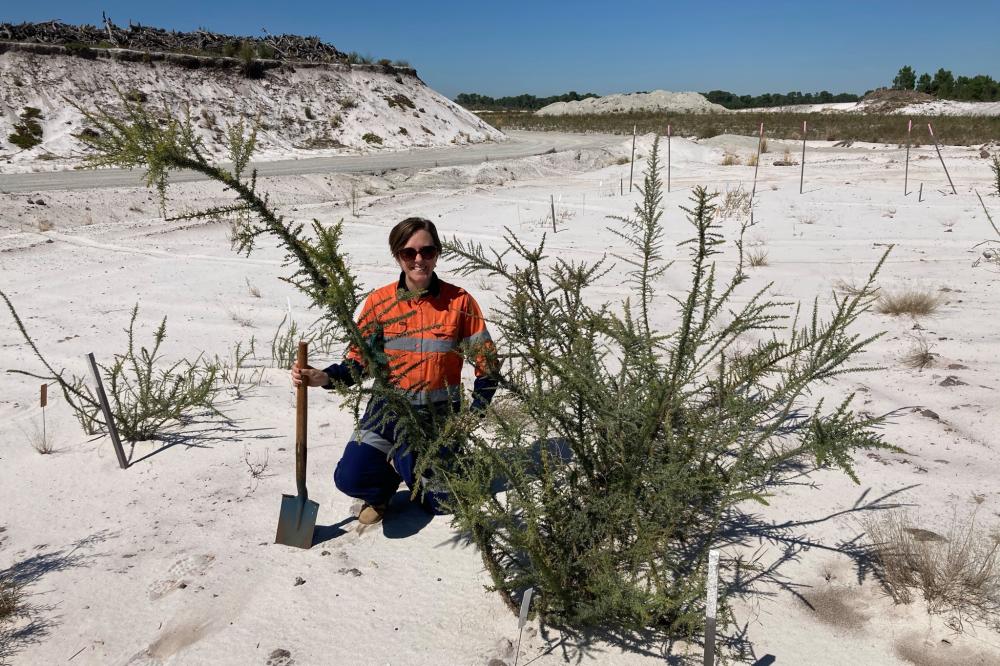Dieback detector dogs do Kings Park
The team at Kings Park were recently visited by two of our favourite furry friends, Alice and Echo – scent-detection dogs who have been trained to sniff out Phytophthora cinnamomi dieback.
While many people are aware of dieback and its presence in Western Australia, it is difficult to understate just how much of an impact this destructive disease is having on local flora.
Phytophthora dieback (often referred to as simply ‘dieback’) is a disease that affects plants, caused by a pathogen from the genus Phytophthora. Over 60 species of Phytophthora have been detected in WA, and while some species are believed to be native, Phytophthora cinnamomi is not. It is thought that Phytophthora cinnamomi originated in South East Asia and was introduced to WA through infected horticultural plants in the early 1900s.
Now, Phytophthora cinnamomi is known as “the biological bulldozer”, and its spread is wiping out plants across the state.
Approximately 40% of native species in the South West bioregion are susceptible to Phytophthora dieback, and threatened species are at even greater risk with around 56% of species susceptible.
The impacts of dieback are negative, permanent and irreversible.
Sadly, national parks, reserves and public gardens in WA have all been affected by Phytophthora, with the disease also extending into Kings Park.
While there is no cure for dieback, its spread can be controlled, making early detection key – enter, the dieback detector dogs.
Alice (pictured) and Echo have been trained since puppies to sniff out Phytophthora cinnamomi, which lives under the ground and attacks the roots of many native plant species.
Now two and three years of age respectively, the dogs are being tested in the field, to assess their efficacy in detecting dieback in different environments and scenarios, and from there, the best ways they can be applied in the future to stop the spread of dieback.
Potential applications include the dogs checking for dieback:
- In soil, gravel or sand samples in the lab or in the field.
- At hygiene checkpoints to clear machinery for use during operations (e.g. mining, forestry).
- In nursery plant stock prior to planting for revegetation.
- In the field in real time, ahead of emergency response scenarios (e.g. during active fires in un-mapped areas to prevent firefighters from inadvertently spreading the pathogen).
- In general field-mapping activities, to improve our understanding of where dieback currently is and where it is likely to spread.
Kings Park is one location where the dogs are being tested, with other environments including regional bushland sites, national parks and DBCA laboratories. The benefit of bringing the dogs to Kings Park is the variety of settings the dogs can be tested in, including the nursery, the WA Botanic Garden and the Kings Park Bushland.
The dogs’ recent visit was part of their second trip to WA, with the dogs trained and based in NSW. In exciting news, DBCA has recently secured funding from the Australian Government Saving Native Species Program to expand the Dieback Detector Dog project, which will include two new Phytophthora cinnamomi scent-detection dogs being trained for ongoing use in Western Australia.
So far in several testing scenarios, the dogs have proven themselves to be as accurate as a human dieback interpreter, so the new detection dogs will be a welcome, and very cute addition to DBCA’s dieback prevention toolkit.
With humans being the main source of dieback spread, we can also play our part in reducing the spread of dieback in Kings Park and all bushland and native flora areas across WA.
Vehicles, boots and equipment can all spread dieback by carrying spores in dirt or mud. When walking, hiking or camping in nature, ensure you ‘arrive clean, leave clean’:
- In Kings Park, stick to designated trails when walking through the bushland and gardens.
- If your boots or camping gear have dirt stuck to them, clean them.
- Utilise DBCA boot cleaning stations where available, or keep a sturdy brush and spray bottle of 70% methylated spirits in the boot of your car and brush and spray your boots or bike after your hike/bike, before you leave the site.
- If you drive through muddy tracks while hiking or camping, stop and wash the car down before entering new areas.
We interviewed some of the key people leading the dieback detector dog program to learn more about these amazing animals. Watch the interview on our YouTube channel.







